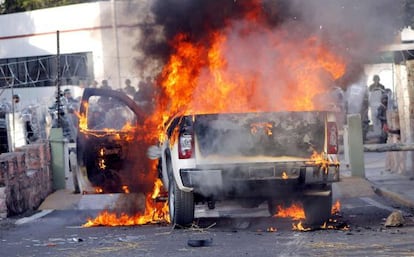Tension rises in Guerrero more than 100 days after Iguala tragedy
Parents of missing trainee teachers clash with Mexican army at demonstration


Demonstrators protested in a dozen Mexican cities on Monday to pressure authorities to continue the search for 43 missing trainee teachers who disappeared on September 26, 2014 after clashing with municipal police in Iguala, Guerrero.
In November, the Enrique Peña Nieto administration claimed the students’ bodies were burnt at a dump site located around 30 kilometers from where they were abducted. Authorities identified one of the students, Alexander Mora, among the remains found at the waste yard. But family members still harbor doubts over the way the case is being handled, and the tension continues to rise more than 100 days after the disappearances.
On Monday, teachers, students and other groups protested in front of military headquarters in four states and in the Federal District. Some Mexican media outlets have suggested that the army might have been involved in the disappearances, but the federal government denies the allegation.
Once again, the rally took a violent turn in Guerrero. Skirmishes erupted in Iguala, where parents of the victims, students and teachers faced off with Mexican soldiers and burst into the buildings in search of the missing. Protestors hurled firecrackers, bottles and stones, and trucks were burnt down in Chilpancingo, the state capital.
The committee of missing students’ parents published a statement condemning the soldiers and saying that the federal government is “unwilling to open a line of investigation to clarify the level of responsibility the Mexican army bears in the forced disappearance of the 43 students.” The committee demands that they be found and returned home “alive immediately.” They demand justice for those who were “unlawfully executed” and the “end of the repression against the relatives of the missing.”
Ninety people have been arrested in connection with the Iguala disappearances, including the city’s mayor, José Luis Abarca. Abarca is being held in a maximum security prison. On Monday, a court indicted his wife, María de Los Ángeles Pineda, on charges of organized crime due to her alleged ties to the local crime cartel Guerreros Unidos, the main suspect in the killing.

According to the investigation, Pineda provided protection and financial support for the criminal organization by laundering more than a million dollars through real estate purchases and by participating in the sale and distribution of drugs. Abarca and his wife were detained on November 4, 2014 in Mexico City.
Meanwhile, the former police chief of Iguala remains at large.
Since October, protests have devolved into skirmishes in various cities throughout the country. The crisis in Iguala put the Peña Nieto administration’s back against the wall in the last quarter of 2014. In December, the president’s approval rating was at its lowest point. In response to Iguala, the government announced a raft of measures aimed at combating corruption and insecurity in the region, including the creation of a single consolidated police force in every state and the means to dissolve local police corps should the need arise.
Translation: Dyane Jean François
Tu suscripción se está usando en otro dispositivo
¿Quieres añadir otro usuario a tu suscripción?
Si continúas leyendo en este dispositivo, no se podrá leer en el otro.
FlechaTu suscripción se está usando en otro dispositivo y solo puedes acceder a EL PAÍS desde un dispositivo a la vez.
Si quieres compartir tu cuenta, cambia tu suscripción a la modalidad Premium, así podrás añadir otro usuario. Cada uno accederá con su propia cuenta de email, lo que os permitirá personalizar vuestra experiencia en EL PAÍS.
En el caso de no saber quién está usando tu cuenta, te recomendamos cambiar tu contraseña aquí.
Si decides continuar compartiendo tu cuenta, este mensaje se mostrará en tu dispositivo y en el de la otra persona que está usando tu cuenta de forma indefinida, afectando a tu experiencia de lectura. Puedes consultar aquí los términos y condiciones de la suscripción digital.








































